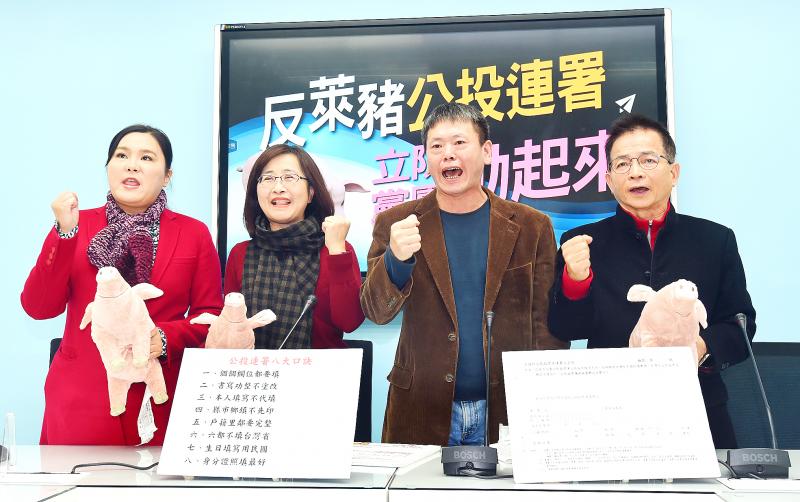The Chinese Nationalist Party (KMT) has begun to collect signatures in the second stage of its efforts to initiate a referendum opposing the government’s decision to lift a ban on pork imports containing ractopamine, it said yesterday.
The referendum question would ask: “Do you agree to a total ban on the importation of pork and related products containing leanness-enhancing additives (ractopamine and other beta-agonists)?” the KMT has said.
A referendum initiative to a needs to clear two hurdles before it can be put to a vote:

Photo: Liao Chen-huei, Taipei Times
The first requires the signatures of 0.01 percent of eligible voters in the most recent presidential election — which would be 1,931 people based on the 19,311,105 people eligible to vote last year.
That threshold was met after the signatures were obtained and approved last month by the Central Election Commission.
In line with the Referendum Act (公民投票法), the KMT in the second stage must collect the signatures of nearly 290,000 people, or 1.5 percent of eligible voters in the most recent presidential election, for the referendum to be held.
KMT caucus whip Lin Wei-chou (林為洲) told a news conference that to guard against signatures being ruled invalid, the party hopes to collect more than 500,000 by the March 21 deadline, when they must be sent to the commission for review.
The party would set up 158 collection sites across the country to reach the goal, Lin said.
Every KMT lawmaker would be responsible for collecting at least 1,000 signatures by the deadline, he said.
The KMT has 38 lawmakers in the 113-seat Legislative Yuan.
KMT Legislator Jessica Chen (陳玉珍) urged the public to support the referendum initiative to safeguard people’s health.
If the initiative is put to a vote, it would need the support of at least 25 percent of all eligible voters, or about 5 million yes votes to pass. The number of yes votes must be more than no votes.
The act stipulates that referendums can only take place every two years on the fourth Saturday in August, with the next possible date being Aug. 28.
Although ractopamine is banned for use in pigs in Taiwan over concerns about the safety of animals and humans, President Tsai Ing-wen (蔡英文) on Aug. 28 last year announced that Taiwan would ease restrictions on imports of US pork containing traces of the drug within certain limits, as well as beef from cattle aged 30 months or older.
The Democratic Progressive Party administration set maximum residue levels for ractopamine in pork to allow imports from the US.
The Legislative Yuan on Dec. 24 approved nine administrative directives related to the decision.
The change, which went into effect on Friday last week, is widely viewed as an effort by the government to satisfy US prerequisites for negotiations on a bilateral trade deal.

The Ministry of Foreign Affairs (MOFA) yesterday voiced dissatisfaction with the Comprehensive and Progressive Agreement for Trans- Pacific Partnership (CPTPP), whose latest meeting, concluded earlier the same day, appeared not to address the country’s application. In a statement, MOFA said the CPTPP commission had "once again failed to fairly process Taiwan’s application," attributing the inaction to the bloc’s "succumbing to political pressure," without elaborating. Taiwan submitted its CPTPP application under the name "Separate Customs Territory of Taiwan, Penghu, Kinmen and Matsu" on Sept. 22, 2021 -- less than a week after China

THE GOOD WORD: More than 100 colleges on both sides of the Pacific will work together to bring students to Taiwan so they can learn Mandarin where it is spoken A total of 102 universities from Taiwan and the US are collaborating in a push to promote Taiwan as the first-choice place to learn Mandarin, with seven Mandarin learning centers stood up in the US to train and support teachers, the Foundation for International Cooperation in Higher Education of Taiwan (FICHET) said. At the annual convention of the American Council on the Teaching of Foreign Languages held over the weekend in New Orleans, Louisiana, a Taiwan Pavilion was jointly run by 17 representative teams from the FICHET, the Overseas Community Affairs Council, the Steering Committee for the Test of Proficiency-Huayu, the

A home-style restaurant opened by a Taiwanese woman in Quezon City in Metro Manila has been featured in the first-ever Michelin Guide honoring exceptional restaurants in the Philippines. The restaurant, Fong Wei Wu (豐味屋), was one of 74 eateries to receive a “Michelin Selected” honor in the guide, while one restaurant received two Michelin stars, eight received one star and 25 were awarded a “Bib Gourmand.” The guide, which was limited to restaurants in Metro Manila and Cebu, was published on Oct. 30. In an interview, Feng Wei Wu’s owner and chef, Linda, said that as a restaurateur in her 60s, receiving an

Kaohsiung Mayor Chen Chi-mai (陳其邁) on Monday announced light shows and themed traffic lights to welcome fans of South Korean pop group Twice to the port city. The group is to play Kaohsiung on Saturday as part of its “This Is For” world tour. It would be the group’s first performance in Taiwan since its debut 10 years ago. The all-female group consists of five South Koreans, three Japanese and Tainan’s Chou Tzu-yu (周子瑜), the first Taiwan-born and raised member of a South Korean girl group. To promote the group’s arrival, the city has been holding a series of events, including a pop-up